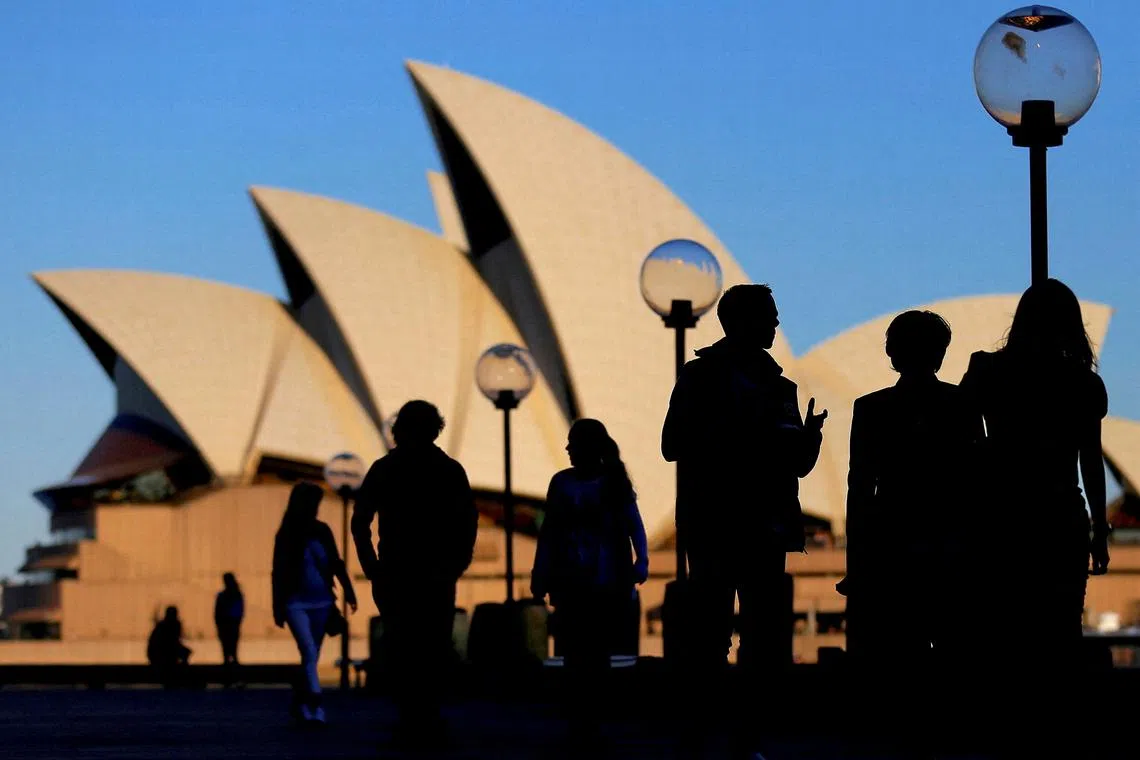More Australians being targeted for espionage, warns spy chief
Sign up now: Get insights on Asia's fast-moving developments

Much of the Australian media coverage of the speech focused on the revelations about specific cases of espionage.
PHOTO: REUTERS
SYDNEY - Foreign spies have been targeting Australians more aggressively than ever, with attempts to influence or exploit a wide spectrum of public servants and professionals, the country’s spy chief has warned.
Each year, the director-general of the Australian Security Intelligence Organisation (Asio) delivers a public address on the threats facing the nation, in what is a rare opportunity for the country’s largest intelligence agency to step out of the shadows and shed light on its operations.
The latest address – delivered on Tuesday by Mr Mike Burgess – was far from reassuring.
The long-serving intelligence official said Asio now faces more threats than at any time since it was founded in 1949 – surpassing the Cold War, the period after the Sept 11 attacks in 2001, and the rise of terrorist organisation Islamic State in Iraq and Syria.
Australia, he said, is not only being targeted by authoritarian countries but also by those with friendly ties with Canberra.
Foreign agents, he said, have attempted to influence or lure information from a vast range of people, including government officials, judges, journalists, bankers, doctors and police officers.
He said rising tensions in the Indo-Pacific region – due to the rivalry between the United States and China and to territorial disputes such as over the South China Sea – are leading to a “thirst for inside information and an appetite for covert influence”.
Mr Burgess avoided naming the countries behind the various plots that he outlined. But intelligence figures and MPs have repeatedly warned – on and off the record – that the main source of attempts to covertly exert influence in Australia is China.
Indeed, former prime minister Malcolm Turnbull told a parliamentary committee on Tuesday: “The most active state and political party seeking to influence public affairs in Australia is that of China and the Communist Party of China – we know that.”
Mr Burgess, in his ominous assessment of the threats facing Australians, said: “Based on what Asio is seeing, more Australians are being targeted for espionage and foreign interference than at any time in Australia’s history.
“From where I sit, it feels like hand-to-hand combat.”
“I want to dispel any sense that espionage is some romantic Cold War notion,” he said. “It’s not – it is a real and present danger.”
Mr Burgess also said: “As we progress (on) Aukus, it’s critical our allies know we can keep our secrets, and keep their secrets.” He was referring to a security pact between Australia, the United Kingdom and the United States to transfer nuclear submarine technology to Australia.
Much of the Australian media coverage of the speech focused on revelations about specific cases of espionage. These included a “hive” of undercover spies put in place by a foreign intelligence organisation years ago to develop a wider network of agents and steal sensitive information.
Mr Burgess also discussed a plot to target senior journalists and offer them an expenses-paid study tour to the foreign country, where spies posing as local officials would collect data from the journalists’ phones and laptops.
He also said some former military personnel had been offered hundreds of thousands of dollars by authoritarian countries to improve their combat skills, describing those who accepted such offers as “more ‘top tools’ than ‘top guns’”.
This candid and chilling account of the threats to Australia appeared to have three main motivations.
First, Mr Burgess appeared to be genuinely concerned that Australians do not appreciate the extent of the threat from foreign agents. Indeed, he launched a deliberate attack on members of the business community, academia and the bureaucracy who had told him that Asio should ease its operations to avoid upsetting foreign countries.
“Anyone saying these things should reflect on their commitment to Australia’s democracy, sovereignty and values,” he said.
Second, Mr Burgess wanted to demonstrate the extent of Asio’s workload and competence, partly to justify to the public the enormous amount of resources that the agency receives.
Asio is housed in a vast, impressive headquarters in Canberra and its annual budget this year is about A$800 million (S$729 million). Indeed, part of the reasoning behind having the director-general give an annual assessment – which began in 2020 – was to allow Asio to publicly account for its powers and its size.
Finally, Mr Burgess will also be keen to ensure that the Labor government, which was elected last May, keeps up its support for Asio. So far, the government has signalled that it is firmly committed to addressing domestic security threats.
In mid-February, Home Affairs Minister Clare O’Neil said the government would do more to “call out” the operations of foreign agencies, naming a plot by Iran that targeted an Iranian-Australian in Australia who had been critical of Teheran.



